December 21, 2016 0 Comments
We're excited to announce that the expansion to our USDA-inspected poultry processing plant and distribution facility is complete! Last Thursday, December 15th, we held an official ribbon-cutting ceremony attended by our management team, employees, and Mayor Nick Nelson of Clemmons.
The expansion, which began over the summer, adds 10,400 square feet of space to our previously 32,350-square-foot facility. It includes a new warehouse of dry storage space for labels, packaging, and other materials, and a brand new, state-of-the-art hatchery that will greatly improve our capacity to incubate and hatch birds in our Heritage Poultry line.

The hatchery will house birds from our Heritage Poultry line — the Poulet Rouge
President and CEO of Joyce Farms, Ron Joyce stated, “Our Welcome Back to Flavor® message is resonating with more chefs and consumers as we have moved back to older breeds, old world farming methods and small scale processing. We have seen increased demand for our pasture raised, heritage products, and we’re thrilled by the response. We look forward to making Joyce Farms available to even more chefs, restaurant goers and home cooks.”
With the addition, we will retain the artisanal processes and strict quality control measures for which we are known. Birds will continue to be individually processed by hand from start to finish, allowing for precise inspection. Our plant has consistently earned a 100% score in animal welfare by a third party auditing company.
Our facility was originally constructed back in 1991, ten years after Ron purchased the company from his father. In 2002, we added a kitchen facility for research and development. The new expansion project marks our first major expansion to the building since it was constructed.
At the ribbon-cutting ceremony, Ryan and Stuart Joyce (Ron's two sons and Joyce Farms' VP of Finance and VP of Operations respectively) officially cut the ribbon together. It marked a special moment for them, because they quite literally grew up here (as you can see below).
Pictured Left: Joyce kids at construction of the original facility in 1991 -- Ashley (left), Stuart (middle), Ryan (right).
Pictured Right: Stuart (left) and Ryan (right) cut ribbon to new expansion.

The design and construction team for the expansion includes Landmark Builders, West & Stem Architects and Landwehrmann Engineering PLLC.
November 15, 2016 0 Comments
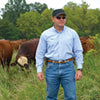 Written By Dr. Allen Williams, Ph.D.
Written By Dr. Allen Williams, Ph.D.
A champion of the grass-fed beef industry as well as cutting edge grazing methodology, Allen helps restore natural soil water retention and reduce runoff, increase land productivity, enhance plant and wildlife biodiversity, and produce healthier food. He also serves as Joyce Farms' CRO (Chief Ranching Officer). Learn more about Allen
 We have talked about what is happening in agriculture — the dichotomy between farmers seeking ever higher yields to fix their financial woes, and those higher yields influencing lower prices. I also mentioned what has been happening with our soils and my concerns over what we are finding, with the caveat of hope. This month, I will set the stage for explaining where we are, where we’ve been, and where we need to go.
We have talked about what is happening in agriculture — the dichotomy between farmers seeking ever higher yields to fix their financial woes, and those higher yields influencing lower prices. I also mentioned what has been happening with our soils and my concerns over what we are finding, with the caveat of hope. This month, I will set the stage for explaining where we are, where we’ve been, and where we need to go.
First, in agriculture, just like in broader pop culture, we have been seeking instant gratification. We have become similar to a lot of today’s kids. They have smart phones, tablets, iPads, etc. at their disposal 24/7 and are seeking instant gratification. If anything takes some time to learn, they become discouraged and often give up on it.
The advent of chemical fertilizers, herbicides, fungicides, supplements, etc., has taught us to anticipate and expect almost instantaneous results. We think if we do not see visual results very quickly, then what we are doing is not working. So, what do we do then? We get upset and anxious and say to ourselves, “Well that didn’t work, so I’m going back to what I know works”. In the process of doing this we are giving up on biology and trying to work solely through chemistry.
In essence we are destroying biology in favor of chemistry because we believe chemistry works better and we are seeking instant gratification. We are thinking singularly.
I will say this, if what you are attempting to achieve through biology isn’t working, it is not the fault of biology but the fault of management. If one method isn’t working, don’t give up on biology, simply try another route. You need to constantly ask yourself questions about what you are doing and it’s potential impact, all the while being highly observant.

The problem with being highly observant is that it takes time. Time we think we don’t have. In talking with a large, respected Midwest farmer the other day, he told me that farmers are so busy simply trying to keep their heads above water that they don’t have time to “waste” trying to figure out all this cover crop and adaptive grazing stuff. He then went on to say that “if it worked so well, why haven’t all farmers already adopted those practices?” We’ve all heard that statement before and we all inherently know it is not a reasonable question. In fact, I could actually reverse the question back to the farmer and ask, “If what most farmers are doing now is causing them to lose money, why are they still doing it?”
In an October 13, 2016 article in Beef Producer, Alan Newport posed the question, “Can Ultra High Stock Density make 10x stock rate?” Interesting question. We know from experience and data that we can certainly see stocking rates increase two to four times within just 5 years when making the switch from conventional grazing to higher stock density adaptive grazing. In several of my past articles, I have detailed many of the benefits of adaptive grazing. Once again though, we have that pesky question, “If it works so well, why isn’t everyone doing it?”
The simple answer is they either don’t know about adaptive grazing or they don’t know how to implement it. Even those who are interested worry about how to initiate it without negatively impacting their financial positions. Many farmers and ranchers are so heavily in debt that they worry about doing anything differently. The truth is very few will suffer financially by better grazing management and moving their livestock more frequently.
Now that we see where we are, lets dive into where we have been and where we need to go. When our forefathers first settled on the eastern shores and then moved across the continent, they were looking primarily for fertile lands for agricultural purposes. In most instances they found them, but the fertility often played out within just a few short generations. Why? Tillage and a tendency towards monoculture agriculture. This manifested itself in a continuous westward migration, as settlers searched for more fertile lands to replace the land they left behind in the east. What nature had built up over thousands of years, we destroyed in a very short period of time.
How did nature build that initial fertility? One of the primary ways was through herds of large wild ruminants. According to a July 2015 article in The Wildernist, bison were a significant factor not only on the western plains, but all the way to the east coast of the present day U.S. Fossil records show that bison were quite common in the Southeastern U.S. from 200,000 years ago or more. The earliest known species of bison in North America was the Bison latifrons, a long-horned species that weighed up to 3000 pounds and had horns that were 6 feet long. At the time of their existence they had to contend with predators such as saber-toothed cats, giant lions, and dire wolves. These bison preferred an open woodland habitat which was common in the Southeastern region at that time.

Somewhere around 24,000 BP (before present time), the Bison latifrons was supplanted by the Bison antiquus, a smaller species weighing up to 2500 pounds with horns intermediate in size between the Bison latifrons and the modern bison (Bison bison). It is thought that the Bison antiquus was more of a migratory animal than the Bison latifrons. The Bison antiquus disappeared due to overhunting by man (early Native Americans). The Bison bison evolved from the Bison antiquus as a smaller species that was more agile and able to migrate over longer distances to escape the pressure from man and from apex predators.
Due to hunting pressure and the tendency to overhunt, North American bison populations fluxed in both total population size and by region. There was a period of time where bison were far less prevalent in the eastern U.S. and much more prevalent on the western plains. However, in the 1500s, Europeans (primarily Spaniards) visiting eastern regions of present day U.S. introduced infectious diseases that decimated Native American populations. As a result, the bison returned to the eastern portions of the U.S. They repopulated rapidly on the abandoned Indian farmland and grassy prairies of the east, feeding under the trees of the open woodlands. They made good use of the grassy understories and the mast crops. They also favored the canebreaks that were prevalent along the many river and stream bottomlands before wholesale clearing of bottomlands by the European settlers wiped out most of the canebreaks.
The Eastern bison were plentiful in the longleaf pine savannas, alkaline cedar glades, bluegrass savannas and woodland, the coastal prairies and marshes, and the Black Belt prairies of Eastern Mississippi and Western Alabama. Bison bones dating to the 1600’s and 1700’s were plentiful in Indian mounds located in Georgia, Florida, the Carolinas, Kentucky, Alabama, Mississippi, etc. Evidence of old “buffalo licks” still exists around the Southeast.
As the European settlers moved westward from the extreme east coast, they eagerly hunted the eastern bison as a source of meat and for their hides. By the late 1700’s, when the American Revolution was taking place, bison were already a rare commodity in the east. Most written records show that the last remaining eastern bison were killed in the eastern U.S. between 1775 and 1825. In Pennsylvania the last known bison was shot in 1801, in Louisiana in 1803, in Kentucky in 1820, and in West Virginia in 1825. Many of the trails used by the settlers were originally bison trails. These early trails have become modern state highways.
When the bison were exterminated from the Eastern U.S., we experienced a significant loss of ecological diversity.
The bison, as large ruminants, were able to maintain open areas in the eastern U.S. through their high stock density grazing and resultant trampling, eating acorns along the way and reducing tree germination. Due to the impact of the bison, as a large ruminant, habitat for a multitude of species was created. Their impact was key in the creation of soil organic matter and fertility. They encouraged plant species complexity and diversity through their grazing actions, and through seed dispersal as a result of their migratory habits. Many plant species that are rare, or even extinct, today were common when the bison roamed the eastern grasslands and open woodlands. They are not prevalent today because they depended on heavy grazing and trampling by large ruminants to reduce their competition. Bird, animal, amphibian, and insect species that used to be prevalent in the eastern U.S. due to bison presence included many species of insects that are unknown to modern man, toads, ground squirrels, burrowing owls, eastern prairie chickens, bobwhite quail, meadowlarks, and upland sandpipers.
Adaptive grazing, as we interpret it today, is simply a form of biomimicry. We are mimicking what the bison and other large ruminants used to provide in terms of biological and environmental impact.
We may be missing the eastern bison today but we can use our cattle to simulate the positive effects the bison had on our environment.
November 08, 2016 0 Comments
One thing that makes Joyce Farms an industry leader in the area of animal welfare is our adherence to the Global Animal Partnership’s 5-Step Animal Welfare program for both our heritage chicken and heritage beef.
The GAP animal welfare program is a higher standard than almost any other animal welfare rating. Founded in 2008, Global Animal Partnership (GAP) is an organization that brings together farmers, scientists, ranchers, retailers, and advocates who want to improve the welfare of animals in agriculture. Originally developed and sponsored by Whole Foods, today GAP is an independent nonprofit that partners with a number of US grocers. Whole Foods is still a major sponsor, and insists that all the fresh beef, pork, chicken and turkey in their store are raised to at least GAP Step 1 standards. To achieve even that, farmers and ranchers must meet more than 100 animal-welfare requirements. Each step above Step 1 requires more.
At Joyce Farms, we’re proud to say that we go well beyond that Step 1 minimum. All of our Poulet Rouge Fermier® Heritage Chickens hold a GAP Step 4 animal welfare rating. The birds are raised in houses offering natural light, natural ventilation, enrichments, 400% more space than conventional birds, and access to additional space in a pasture. Our Heritage Aberdeen Angus cattle are also GAP Step 4, raised on farms that routinely pass the strictest audits for humane handling.
How does the GAP program compare to other ways of determining how an animal is raised? According to a ranking by The Wall Street Journal, a label indicating an animal was raised using GAP standards is a much better way to judge animal welfare than either of the more common “American Humane Certified” or “USDA Organic” labels. And the experts at humaneitarian.org put it even more bluntly: “Generally speaking, if you want chicken, pork, or beef raised in a pasture-centered way, look for GAP products labeled Step 4 or Step 5.”
October 25, 2016 0 Comments
The USDA requires that processed chickens be chilled to at least 40 degrees within four hours of killing. Within our industry there are two accepted ways to do this – using air or using water. Most processors use the latter method, cooling their chickens in large communal vats of ice cold chlorinated water. But at Joyce Farms, we choose to air chill all our Heritage Poultry, and we inject them with nothing. Here’s why.
When chickens are water chilled, they absorb some of the water they’re placed in and then they’re injected with more water, so when you buy water-chilled chicken, part of what you’re paying for is water.
Some estimates say that, on average, water is actually 8% of the chicken’s body weight when it’s sold. But when you buy air-chilled chicken, all you’re paying for is chicken.
Because the birds aren’t subjected to the chlorine or added salt and water that is absorbed by the birds in the industrial chilling tanks, top chefs agree that air chilling preserves the true flavor of the birds.
The water in water-chilled chicken evaporates as it cooks, creating shrunken, rubbery chicken, especially when it’s grilled or barbecued. Further, air-chilled chicken cooks faster, absorbs marinades and seasonings much better, and has a crispier skin after cooking.
Air-chilled chickens are cooled individually, while water-chilled chickens are dunked in a communal pool. With air chilling there is much less chance for bacteria to spread among chickens.
In fact, a University of Nebraska study found that air-chilled chicken contains 80% less bacteria than water-chilled chicken.
In the last few years we’ve seen major droughts in both the southeastern and western United States. In those conditions, every drop of water becomes precious. According to one expert, if the 9 billion water-chilled chickens processed annually were air chilled instead, 4.5 billion gallons of water would be saved.
There you have it. Our goal is to offer our customers the best poultry in the world, and we believe air chilling contributes to achieving that. And experts agree. Not long ago the website TheSoftLanding.com looked at air-chilled chicken vs. water-chilled chicken and declared Joyce Farms air-chilled, heritage Poulet Rouge™ chicken to be the best on the market!
Air-Chilled Chicken vs Water-Chilled Chicken: Is There a Winner? (thesoftlanding.com)
If You’re Not Cooking With Air-Chilled Chicken, You’re Doing It Wrong (Bloomberg.com)
October 14, 2016 0 Comments
 Written By Dr. Allen Williams, Ph.D.
Written By Dr. Allen Williams, Ph.D.
A champion of the grass-fed beef industry as well as cutting edge grazing methodology, Allen helps restore natural soil water retention and reduce runoff, increase land productivity, enhance plant and wildlife biodiversity, and produce healthier food. He also serves as Joyce Farms' CRO (Chief Ranching Officer). Learn more about Allen
Beyond Meat®, a company that calls itself the Future of Protein™ has recently been the benefactor of investment from what might seem like a strange place. Tyson Foods, a member of the Big Four meat packers, has become a 5% owner in the company that hopes to replace meat with plant-based proteins. According to news reports in the New York Times, Business Insider, and MeatingPlace, the investment is the result of a fundraising initiative by Beyond Meat targeted at providing capital to fund expansion of their product portfolio and distribution.
In a statement by Ethan Brown, Founder and CEO of Beyond Meat, he said, “This investment by Tyson Foods underscores the growing market for plant protein. I’m pleased to welcome Tyson as an investor and look forward to leveraging this support to broaden availability of plant protein choices to consumers.”
At the joint disclosure, a Tyson executive, Monica McGurk, expressed enthusiasm with the investment and added that it “…gives us exposure to a fast-growing segment of the protein market.” McGurk went on to say that the investment will increase consumer choices from the Tyson portfolio of food products and will allow Tyson to satisfy demands from a growing diverse population. She did directly state that Tyson would remain focused on their animal protein base.
Products currently offered in the Beyond Meat portfolio include the Beyond Burger™, single serve meals with Beyond Beef® and Beyond Chicken® protein alternatives, the Beast Burger, and Southwest Style Beyond Chicken® Strips. Most packages have a facsimile of a steer or chicken on them.
Beyond Meat was founded in 2009 as the result of more than a decade of research by a Dr. Fu-Hung Hsieh at the University of Missouri. Hsieh’s research has focused on taking soy proteins and producing meat analogs that are palatable and that appear to be similar to real muscle foods. The Beyond Chicken products are a combination of non-GMO soy and pea protein. The Beast Burger is a 100% pea protein extrusion and is touted as a “soy-free, gluten-free, non-GMO” product.
Whole Foods Markets first started carrying Beyond Meat products in 2013 at select stores. The company’s products are now sold in more than 10,000 stores nationwide.
Other investors in Beyond Meat include Bill Gates, Kleiner Perkins, the founders of Twitter, Biz Stone, General Mills, and the Humane Society of the United States. The former CEO of McDonald’s North American operations, Don Thompson, sits on their board of directors.
The question for us as producers of pasture-based protein products is not whether there will be challenges in the market place from plant-based protein alternatives, but rather how will we respond to that market challenge? There will be a segment of the consumer population that believes plant-based proteins are a better choice for their health and the environment. For those of us in regenerative agriculture, we know that animals in the mix allow for rapid rebuilding of soil organic matter, reduction of erosion, reduced chemical inputs and harmful runoff, increases in plant species diversity, and improvement in pollinator insect, beneficial insect, and wildlife populations.
Animals in the mix allow for rapid rebuilding of soil organic matter, reduction of erosion, reduced chemical inputs and harmful runoff, increases in plant species diversity, and improvement in pollinator insect, beneficial insect, and wildlife populations.
Where crops are grown without the benefit of proper livestock impact, we see serious issues with soil compaction, water infiltration rates, water quality, erosion, harmful runoff, and increased reliance on synthetic chemical inputs and irrigation.
The loss of soil organic matter, soil aggregation, and fertility across farmlands in North America over the past several decades has been staggering. The focus on the current monoculture agricultural model has created a lot of unintended consequences that are proving detrimental to our environment and to human health.
What we have to consider is that animals, particularly the natural mix of large and small ruminants, followed by grassland birds, have played a significant role for millennia in building the tremendous fertility across the grasslands and savannas of the world. For thousands of years these wild ruminants were an essential part of nature’s design moving about in large groups or mobs due to constant pressure from apex predators. The result of their grazing of the grasslands and savannas was incredible diversity and complexity in soil, plant, insect, bird, and animal life.
In regenerative agriculture, we use our livestock and poultry the way nature intended – to build and maintain soil fertility and diversity in soil, plant, insect, and animal life. Moving to a plant only diet will further increase issues brought about by monoculture agricultural systems.
The beautiful thing about raising animals the way we do is that we are reviving nature’s bounty while providing the consumer with protein products that contain favorable fatty acid profiles; are loaded with minerals, vitamins, and antioxidants; and actually improve the environment.
Our problem – the average consumer is unaware of the myriad benefits of raising livestock and poultry in pasture-based systems through regenerative practices. It is incumbent upon us to do a much better job of informing consumers that they do have a choice in their protein purchase decisions.
With so many confusing market claims and labels, the consumer is often left grasping at straws, wondering what is factual and what is simply smoke and mirrors. We must be true to our label claims, clearly communicate to the consumer, and provide factual information to back up those claims. Trust is everything and we must be trustworthy.
September 26, 2016 0 Comments
When you buy grain-fed beef in your local grocery store, it probably has a US Department of Agriculture (USDA) grade on it. The USDA grades meat quality for tenderness, juiciness, and flavor, and there are eight quality grades for beef. How are they determined? According to the USDA, “Quality grades are based on the amount of marbling (flecks of fat within the lean), color, and maturity.”
Prime grade, for instance, “has abundant marbling,” while Choice grade (the grade most commonly found in grocery stores) is “high quality, but has less marbling than Prime.” Select grade, meanwhile, “is very uniform in quality and normally leaner than the higher grades…but, because it has less marbling, it may lack some of the juiciness and flavor of the higher grades.”

So for the USDA, the grading is largely based on the marbling. Why? Because feeding cows grain not only gets them fatter quicker, it also enhances fat marbling. Marbling is the intramuscular fat that adds juiciness and some elements of tenderness to beef. Because almost all US cattle are finished on grain, and have been for decades, marbling became the quickest and easiest way to grade the beef.
This is why a lot grass-fed beef producers say their product gets the short end of the steak when it comes to grading. They’ll tell you that their grass-fed beef is leaner and healthier than grain-fed beef, but not as marbled, so for them to get a USDA Choice or Prime grade for their grass-fed beef is impossible. And frankly, for THEIR grass-fed beef, it probably is.
But it’s not impossible for our grass-fed beef to get a USDA Choice or Prime grade; we know that because ours does. In fact, Joyce Farms is one of only a few grass-fed beef producers in the country that elects to have our beef USDA quality graded.
Because we have cattle with the right genetics and we utilize superior raising and forage grazing standards, our grass-fed beef can offer the tenderness, the delicious taste and, yes, the marbling required to get a USDA Choice or Prime grade. Want proof? Just check this out...

So don’t believe the myth that a delicious, well-marbled, USDA Choice or Prime grade grass-fed steak is unrealistic, and that off-flavors, lack of marbling, and a lack of tenderness is part of the grass-fed eating experience. To top it all off, that added marbling is loaded with healthy Omega-3’s and CLA’s and other healthy fats. If you’re looking for grass-fed beef that’s healthy and makes the grade, look no further than our Heritage Aberdeen Angus Beef.
Note to our web shoppers: The cuts sold on our web store are USDA Choice or Select grade, and grades are noted in product descriptions. Due to such high demand from our foodservice customers, we are unable to offer Prime Grade on the web at this time, but you can find it on the menus of a number of fine-dining restaurants across the United States!
September 21, 2016 0 Comments
Joyce Farms Poulet Rouge Fermier® chickens have it pretty good. Not only do we raise them naturally and according to some of the same standards used in the French Label Rouge program; We also make sure they live a happy life, doing what chickens like to do, growing in their own space and at their own pace.
What’s a typical day like for a Poulet Rouge® chicken? It starts early – they’re up with the chickens. Not because we make them get up, but because, well, they’re chickens. They roam freely in a small, comfortable poultry houses, surrounded by their fellow chickens. The flocks are small, so each bird has plenty of room, and all of the birds are sure to get the care and attention they deserve.
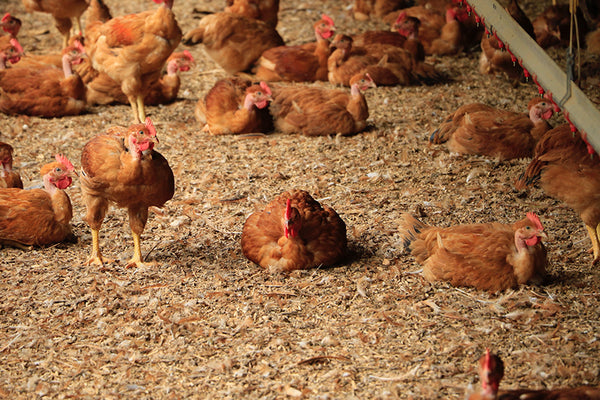
They’re given access to the outdoors from 9 a.m. until dusk, so the birds can have their own version of “recess” — running, socializing, or just relaxing and catching some rays.
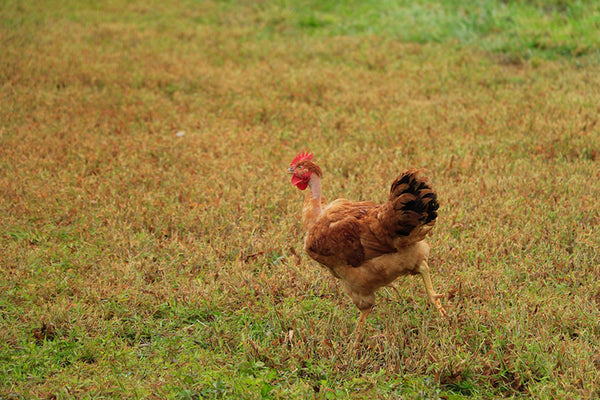
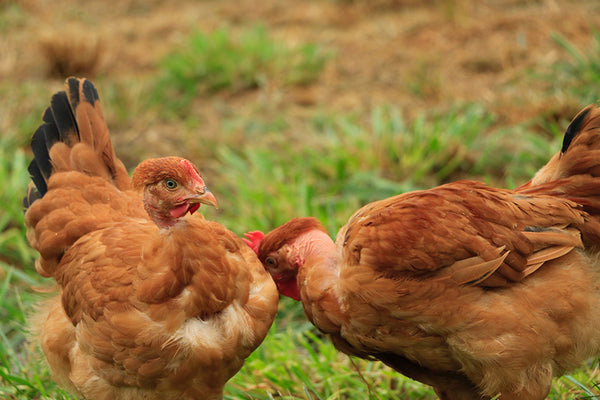
They’re given music to listen to (usually classical, which seems to soothe them), and toys to play with, like these hanging CDs. Chickens love bright shiny objects.
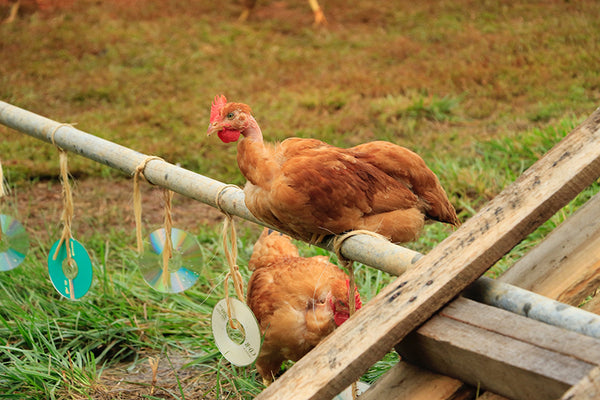
Occasionally they might even engage in some yard games, like this friendly staring contest.
July 26, 2016 0 Comments
Look out for us in the August issue of The Local Palate! Read about our unique heritage poultry operations, slow growth breeds, traditional methods, and how we achieve that unbelievable flavor.
click image or here to read
July 20, 2016 0 Comments
According to a study by the International Food Information Council Foundation, the majority of shoppers say taste has the biggest impact on their food choices — more than price, convenience, sustainability, or even nutrition. What that means for producers of grass-fed beef is that they can tout its nutritional and ecological superiority all day long, but if it doesn't taste good, people won’t eat it.
One of the biggest complaints about grass-fed beef is inconsistent taste and off flavors. The reality is, grass-fed beef can taste as good or even better than grain-fed beef — the difference comes down to three key variables: grass, grazing, and genetics.
If grass-fed beef doesn’t get the right forage – the perfect cocktail (as we call it) of mature grasses and legumes – it doesn’t always taste good. A lot of grass-fed cattle are raised in what’s called a “monoculture pasture” where the grasses are at a single root depth, and they draw their mineral content from only one layer of soil. The result is meat that can have a metallic flavor. However when grass-fed cattle are raised in multi-culture pastures, eating forage made up of a variety of grasses and legumes that provide a balanced mineral intake from multiple root depths, there is no metallic taste in the meat.
It’s not just the variety of things the cattle eat that matters. It also matters when they eat them. Grass-fed beef can have an off-flavor that tastes of liver or game when the cattle’s forage isn’t mature enough and contains too much protein and not enough carbohydrate (sugars). To prevent this, the forage can be measured for Brix. Without getting too scientific, Brix is a measurement of the sugars, amino acids, oils, proteins, flavonoids, minerals and other nutrients in a food. By monitoring Brix levels closely, the cattle can be brought to pasture for grazing when the forage is at optimum maturity, so they only eat the sweetest grass and have the best tasting meat.
Producing great-tasting grass-fed beef isn’t as simple as just switching to a grass-fed diet; you have to start with the right cattle. Most beef produced in America today comes from modern cattle that have been selectively bred to produce larger animals that finish well in a commercial feed lot; they just aren’t built for a grass-based diet. In fact, less than 5% of cattle genetics in the US will produce quality beef on grass.
Our Heritage Beef comes from true Aberdeen Angus cattle raised exclusively in multi-cultural pastures eating forage that is mature and sweet. Joyce Farms maintains a bloodline of this prized heritage Aberdeen Angus breed – the original Angus of 18th century Scotland.
There are a lot of different grass-fed beef producers out there, and it’s important to know that not all grass-fed beef is the same. At Joyce Farms, we go to these lengths because we’re just like you – if we’re going to eat our grass-fed beef (and we are), we want it to taste delicious (and it does).
July 15, 2016 0 Comments
Here's a sneak peak at our healthy, happy, heritage turkey poults! They're only 1 week old, but they're already feeling right home on our farms with lots of TLC from our dedicated farmers.
These special birds carry the heritage genetics of the traditional Spanish Black turkey, a slow-growing breed believed to be one of the first developed from Native American stocks. We raise them free range on our farms with nothing added, ever — no added hormones, steroids, antibiotics, or anything artificial.
June 16, 2016 0 Comments
 Written By Dr. Allen Williams, Ph.D.
Written By Dr. Allen Williams, Ph.D.
A champion of the grass-fed beef industry as well as cutting edge grazing methodology, Allen helps restore natural soil water retention and reduce runoff, increase land productivity, enhance plant and wildlife biodiversity, and produce healthier food. He also serves as Joyce Farms' CRO (Chief Ranching Officer). Learn more about Allen
In addition to being part of the Joyce Farms team as Chief Ranching Officer, it’s my privilege to serve on a number of industry boards and committees, including the board of directors for the Grassfed Exchange. The Grassfed Exchange is a volunteer, non-profit organization of regenerative ranchers and grassfed industry supporters that holds the largest grassfed industry conference held annually in the U.S.
Each year the Grassfed Exchange Conference brings together farmers, ranchers, industry professionals and experts, university personnel, and USDA personnel for the exchange of ideas and information through seminars, farm tours and educational presentations.
They also use the occasion to give out awards to the “best of the best” in our industry. The 2016 Grassfed Exchange Conference was held in Perry, GA on April 27-29, with attendees coming from 42 different states and 5 different countries. I’m proud to say that at that conference, Ron Joyce and Joyce Farms were unanimously selected as the Grassfed Exchange Distributor/Marketer/Retailer of the Year.

The purpose of these awards is to recognize and honor those who have made significant contributions to the production of good food and agricultural stewardship, and Joyce Farm’s dedication to offering the consumer not only healthy products that are good for the land, the animals, and us -- but also products that are tender and delicious – was one of the major reasons for their selection for this award.
In naming Ron Joyce and Joyce Farms the winners, the selection committee cited their 50+ years of contribution to regenerative agriculture, revitalization of the rural economy, production of high attribute proteins, and commitment to providing consumers with a healthy choice in grassfed beef and poultry.
Receiving this award is a significant achievement, and I’m delighted Ron and the team here were chosen. Working with them, I see their hard work and dedication to quality every day, and it’s nice to see it recognized by our peers. It’s also a compliment to Joyce Farms customers, because when you choose Joyce Farms products, you’re choosing the industry-recognized best there is.
May 25, 2016 0 Comments
The Joyce Farms Poultry Science Scholarship was established in 2007 to support students pursuing careers in agricultural science at NC State University. Each year, students from the College of Agricultural and Life Sciences submit applications and essays for consideration. One outstanding applicant is selected to receive $1,000 from Joyce Farms to help fund his or her education.
It’s a difficult task to choose just one from our many qualified candidates. We consider academic standing, past achievements, and demonstrated passion, skill, and determination.
This year, we are pleased to announce Ray Borzotra as the 2016-17 recipient of the Joyce Farms Poultry Science Scholarship!
 Ray moved to North Carolina during his senior year of high school just to study at NC State University after graduation. Now he is enrolled and living his dream, pursuing both an Animal Science and a Poultry Science degree. Ray has a particular passion for veterinary science. After high school graduation (where he graduated 21st in his class), he spent his summer shadowing a local vet. After college, Ray plans to either continue studying large and small animal veterinary medicine at NC State Veterinary School of Medicine or work at a local poultry farm.
Ray moved to North Carolina during his senior year of high school just to study at NC State University after graduation. Now he is enrolled and living his dream, pursuing both an Animal Science and a Poultry Science degree. Ray has a particular passion for veterinary science. After high school graduation (where he graduated 21st in his class), he spent his summer shadowing a local vet. After college, Ray plans to either continue studying large and small animal veterinary medicine at NC State Veterinary School of Medicine or work at a local poultry farm.Congratulations and best of luck to Ray and all of our impressive applicants!
Find information on how to apply for future scholarship consideration here.
